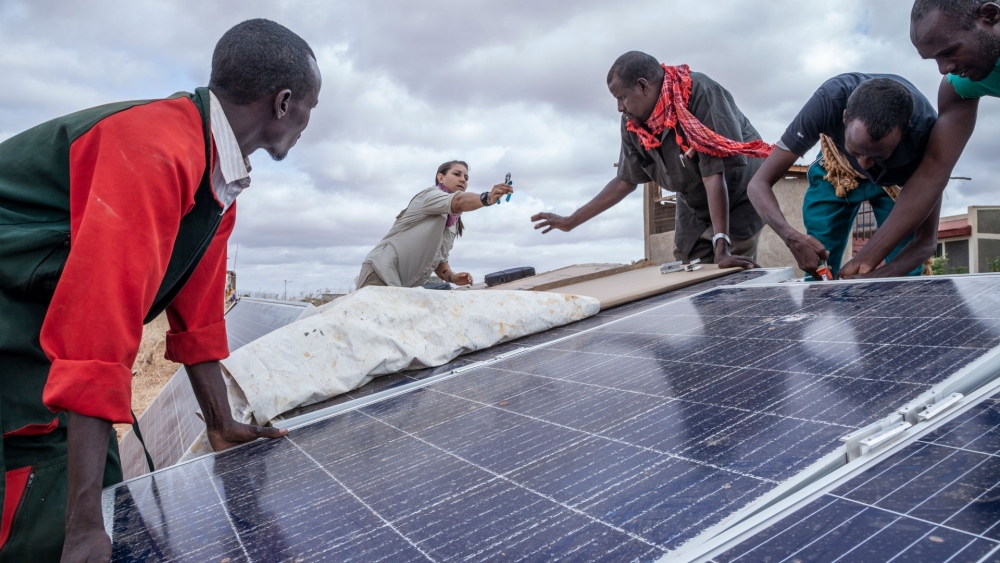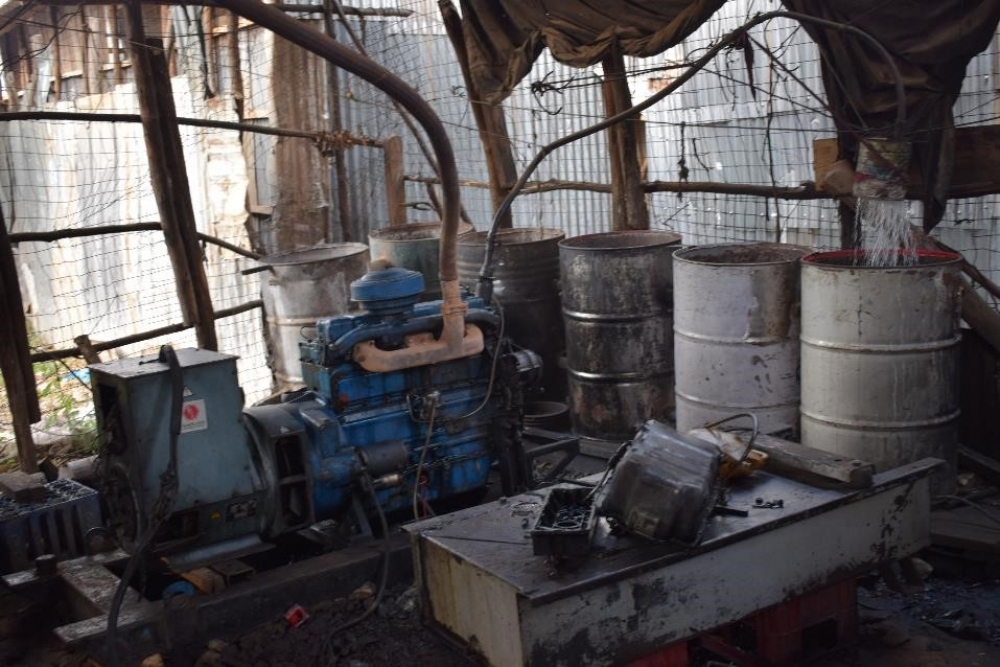In this section
In this sectionThe German Federal Foreign Office formally committed 21 million EUR to support the sustainable energy transition in displacement settings. The new Decarbonising Humanitarian Energy (DHE) Programme will reduce the costs and greenhouse gas (GHG) emissions associated with delivering critical humanitarian assistance in five countries in the Sahel Region. This funding forms the initial investment in the Multi-Partner Trust Fund (MPTF) and provides multi-year support for scaling up sustainable energy solutions for organisations serving displaced people and host communities. The DHE MPTF is implemented by the GPA Coordination Unit at UNITAR, NORCAP, and UNDP.
The majority of electricity supplied for organisations in displacement contexts comes from diesel generators – estimated by the GPA CU to cost over $100 million and emit more that 200,000 tonnes of CO2 globally. This presents a huge opportunity for sustainable energy solutions but these organisations often lack the technical capacity, funding, and local market environments to implement them. The DHE MPTF uses energy efficiency measures to first decrease electricity consumption, and then uses renewable power to offset the remaining usage on fossil fuels, to reduce both costs and GHG emissions.
Under the DHE MPTF the consortium deploys energy experts to provide technical assistance, develop business cases for project sites and organisations, and finance the implementation of sustainable energy solutions. New de-risking mechanisms, contractual frameworks and green financing opportunities supports the private sector in delivering viable, long-term solutions for organisations – and in extending the benefits of electricity access to affected communities directly.
This generous funding from the German Federal Foreign Office provides crucial support for scaling up sustainable energy in the Sahel region and represents a major step towards achieving SDG7 in displacement settings worldwide.
Transitioning to sustainable infrastructure
Humanitarian agencies acknowledge the need to shift their dependence from fossil fuels and transition to more sustainable approaches to generating and consuming electricity, however, systemic barriers are preventing them from doing so, which results in the continued purchase of diesel generators as their primary source of power in locations suffering from energy poverty.
Recognizing this, a series of workshops were convened by the GPA Coordination Unit, GIZ and Shell during 2019 in order to identify practical ways to unlock the impasse and support the development of concrete solutions. The results from the workshops were then used to co-design concrete solutions that focused on replacing existing or planned, diesel generators with renewable or hybrid energy solutions supplied by the private sector through Power Purchase Agreements (PPAs) or Leasing Agreements.
Two priority activities were identified by the workshop participants in order to facilitate the large-scale uptake of these alternative delivery models, namely the development of: standard contractual terms for PPAs and Leasing Agreements (download the subsequent report from Energypedia); and a de-risking mechanism that protects the commercial entity’s capital investment from the UN’s standard contractual termination clause, which is a precondition of all long term agreements.
With technical and financial support from Shell, Energy MRC were contracted to develop a de-risking mechanism that could facilitate long term energy service contracts between humanitarian actors and third-party renewable energy providers. The subsequent report can be downloaded from Energypedia.
Derisking Sustainable Investment
The proposed derisking mechanism is based on a two-phased approach:
- Phase One: A short term liquidity facility would provide post-termination cashflow to the energy service company for up to 12 months, which would provide an opportunity to explore alternatives uses for, and/or off-takers to, the existing energy system to offset termination liabilities and act as a time buffer for the UN Agency to draw down on the guarantee mechanism.
- Phase Two: A guarantee mechanism would payout to the UN to cover its termination liabilities to the energy service company.
The proposed approach mitigates contractual and financial risks associated with the UN’s Termination Clause, in doing so:
- It attracts energy service companies to the humanitarian sector;
- It limits the possibility of energy service companies charging a premium for electricity to cover its contractual and financial risks; and
- It permits the UN to outsource electricity supply and concentrate on its core activities.
In addition, high-level modeling of a sample portfolio of 70MW of solar projects (~700 facilities) with an assumed CAPEX of 65m USD could be underwritten by a guarantee fund of just 6m USD. The next step is to develop and test the derisking mechanism in humanitarian settings, to support the decarbonization of UN energy infrastructure through energy service contracts.
The scale of the challenge
Recently, the GPA Coordination Unit conducted a survey among energy experts in the humanitarian system to estimate the number of diesel and petrol generators that are used to produce electricity in humanitarian operations, with a view to establishing the opportunities to transition to solar solutions.
Based on feedback from six UN organisations and ICRC, we estimate that there are currently more than 11,000 generators in use around the world. Our initial conservative estimates are that humanitarian agencies spend more than $100 million on fuel per year, emitting almost 200,000 tonnes of CO2. In addition, we have also estimated that a total investment of around $250 million would be necessary to solarise viable systems, which could save around $70 million in fuel costs and around 125,000 tonnes of CO2 per year. Read more on this study here.
Our next steps will be to refine these initial order-of-magnitude estimates and explore how to meet organisational sustainability targets by taking advantage of the opportunities available through solar solutions. For more information about our work, or how it could be applied in your organisation, please contact energy@unitar.org.
Last updated: 22/06/2023


